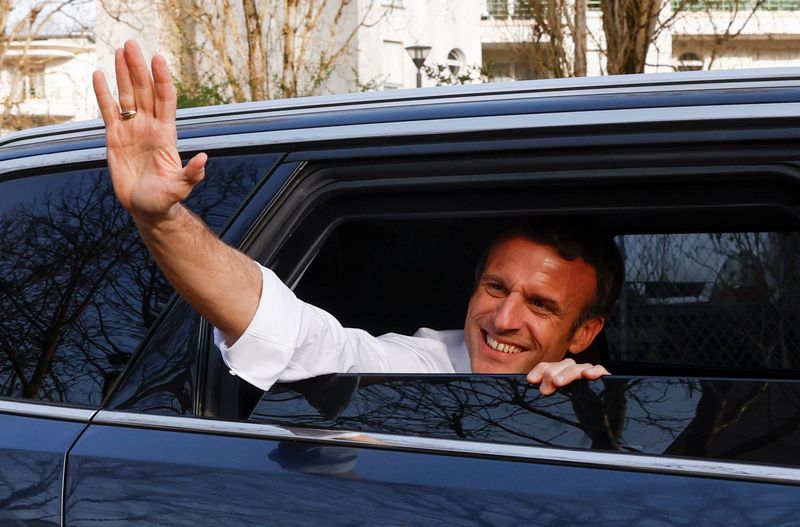PARIS (Reuters) – France’s presidential election in April is Emmanuel Macron’s to lose. Most opinion polls show the incumbent president reaching the second round and winning re-election.
However, after a first term mired in social unrest – during which he took steps to liberalise France’s labour laws, cut taxes on the wealthy and businesses and tried to reconfigure trans-Atlantic relations – the margins are tighter than the drubbing he delivered to the far right’s Marine Le Pen in 2017.
Here’s a look at the leading second-round scenarios:
MACRON – LE PEN
Until the autumn, conventional wisdom was that the vote would be a repeat showdown between Macron and Le Pen. It was a contest Macron sought: voters have consistently kept her far-right party out.
Le Pen remains the most likely candidate to face Macron in a second-round runoff, all the more so as her ratings have recently improved, opinion polls show.
However, her place is not assured as there is competition from others on the right and the left for the second spot.
Le Pen has sought in recent years to soften her Rassemblement National party’s euro-sceptic, anti-immigration image to broaden its popularity in France, which has never had a woman president.
But her past admiration for Russian President Vladimir Putin may hurt her image as war rages in Ukraine.
Surveys show her picking up to 21% in the first round.
In the second round, required if no candidate wins a simple majority of votes cast in the first round, Macron would beat Le Pen with 53% to 58% of vote, opinion polls suggest – a narrower margin than the defeat she suffered in 2017.
MACRON-MELENCHON
Melenchon is the only left-wing candidate to poll among the top five challengers.
With the traditional centre-left Socialist Party verging on irrelevance and the Greens struggling to galvanise a wide support base, Melenchon has appealed to left-wing voters to rally behind him.
In his campaign manifesto, Melenchon, a strong orator running for president for the third time, pledges to put controls on the movement of capital, guarantee jobs for the long-term unemployed and lower the retirement age to 60 from 62.
Now polling around 14% in voter support surveys compared with 9-10% in January, he has risen to third place in the election race behind Macron and far-right Marine Le Pen. Polls see Macron easily beating Melenchon if he makes it to the second round.
MACRON – ZEMMOUR
The rise last year of Eric Zemmour, the talkshow star who channels former U.S. President Donald Trump’s anti-establishment style as he paints himself as the would-be saviour of a nation under a perceived threat from Islam, upended the early campaign race.
Some surveys showed Zemmour reaching the second round, but his support has fallen back as he struggles to formulate ideas beyond immigration and security and has been hurt by his comments on Russia.
Opinion polls show him winning 9-13% of votes in the first round.
Zemmour, an eloquent orator and best-selling author, says non-Christian names such as Mohammad and the wearing of religious symbols such as Islamic headscarves should be banned because they erode France’s identity as a Christian civilisation.
Macron would comfortably defeat Zemmour in the second round, polls have shown.
MACRON – PECRESSE
The head of the greater Paris region, Valerie Pecresse, who describes herself as part Margaret Thatcher, part Angela Merkel, won the conservative Les Republicains’ ticket in December, which gave her a boost in opinion polls.
However, Pecresse, a moderate within conservative ranks, has seen her campaign falter as she struggles to set herself apart from Macron while countering the nationalist programmes offered by her far-right rivals.
Pecresse says she would end the 35-hour work week, raise the retirement age to 65 from 62 and ban women accompanying their children on school trips from wearing a Muslim headscarf.
Recent opinion polls show her winning 10-13% of votes in the first round.
(Reporting by Richard Lough and Ingrid Melander, Editing by Peter Graff, Timothy Heritage, William Maclean)
